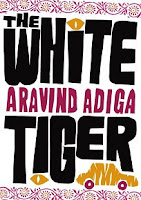SANDRA BABU ~ 5066
"WHITE TIGER "- A Reflection ....
 |
| Aravind Adiga |
The 'White Tiger” written by the
Indian-Australian author Aravind Adiga, is a debut novel published
in 2008. It won the 40th Man Booker Prize that year
itself.
The White Tiger is presented as a
epistolary novel,a series of seven letters written over a period of
seven nights. It's just an excuse,of
course, for the narrator Balram Hawai to tell his story.
Balram is writing to the premier of China, Wen Jiabo, who is to
visit the city Balram lives in –Bangalore,India—in a week's
time.What made an Indian entrepreneur living in Bangalore
to write such a lengthy letter to the chief of China,describes the
condition of India and is the central theme of the story.
Balram explains that
something in China is missing in India and vise versa,thus makes
occasional comparisons between the two neighbouring nations but
ultimately proves that to be feeble excuse for him to unburden
himself, and because the premise is so poorly utilised undermines
such novel. The story circles around the
crime he has on his hands and gets to it in
good times ,as he recollects the whole story chronologically.
He was his parents' 'munna' in a
tiny hell-hole called Luxmangarh, a place in India, where
opportunities were limited. Balram calls
himself 'half baked', like many others in the country,not allowed
to finish school,with only smattering of all sorts of knowledge.
In fact he was smart lad, and that was even recognized
by a school inspector,who praised him as
'WHTE TIGER',”the rarest of animals”-the creature that only comes
along once in a generation.
The novel explains how family becomes a
priority for Indians which makes their every actions focused on the
happy faces of family. But here the
protagonist slowly creates a distance from his family.
Being a chauffeur of Mr. Ashok and
Pinky madam(his wife),he eventually gets in Delhi comfortably far from his
demanding family.
Balram explains why Indian servants
are so honest:because of what he calls
Rooster Coop. No matter what the
opportunity,a servant won't take advantage of his master. A bag containing a million dollars can be
entrusted to any servant,he claims,because doing anything improper would
have a terrible consequences. The servant
might get away with it but:
 "only
a man who is prepared to see his family destroyed, hunted, beaten,and
burned alive by the masters,can break out of the coop.
That would
take no normal human being,but a freak,a pervert of nature." And Balram eventually became such a servant due to his experiences which made him kill his master,Ashok.
"only
a man who is prepared to see his family destroyed, hunted, beaten,and
burned alive by the masters,can break out of the coop.
That would
take no normal human being,but a freak,a pervert of nature." And Balram eventually became such a servant due to his experiences which made him kill his master,Ashok.
Yes,The
White Tiger 'says a lot' about contemporary India,but it tries to do
so far too hard.
Adiga has
definitely the talent and courage to open the devastating but blinded
conditions of India to the public.
In the novel,Adiga
makes Balram say,'I am tomorrow' which may not be correct at
least for some
reasons while looking into the developing
nature of
India...But to an extent its true as whatever development comes,the
marginalized
people are left to be the same.
Through
the novel Adiga examines issues of religion,caste,loyalty,corruption
and poverty in India.
Ultimately Balram
transcends his sweet maker caste and becomes a successful
entrepreneur, establishing his own taxi service.
In a nation proudly
shedding the history of poverty and underdevelopment he presents
himself as ,”Tomorrow”. To conclude Aravind Adiga's White Tiger is
a brilliant social critic which unties the life of ordinary people of
outskirts who eventually get transformed to a 'city man' in its real sense.
No comments:
Post a Comment